Came from humble beginnings in the town of Wadowice
35 miles southwest of Krakow Poland
Karol WOJTYLA Sr.
Son of a master tailor Maciej and Anna, born July 18, 1879 at Lipnik near the city
ofBielsko Biala Poland
then lieutenant in the Polish army until his retirement in 1927.
of
then lieutenant in the Polish army until his retirement in 1927.
Emilia KACZOROWSKI
Daughter of a pack-saddle maker and refurnishes carriages,
named Feliks and Anna
named Feliks and Anna
Born 26th of March 1884 in Kraków , Poland
"Karol WOJTYLA" married "Emilia KACZOROWSKI"
on10 Feb 1906 Wadowice , Poland
on
They had three children:
1. Edmund Charles WOJTYLA was born on 27 Aug 1906
****************************
2. Olga WOJTYLA was born and died in 1914.
****************************
3. Karol Jozef (Lolek) WOJTYLA
May 18, 1920 - Karol Józef Wojtyla, was born in the small Polish town of
He lived with his parents
In this apartment building at Rynek 2
(now7 Koscielna Street
(now
Now changed into a little museum.
It was established onMay 18th, 1984 ,
It was established on
64 years after John Paul II was born.
It contains a particularly large, chronological collection
of the pope's photos, some of his personal belongings
(including the tourist and sports equipment)
of the pope's photos, some of his personal belongings
(including the tourist and sports equipment)
and a set of vestments.
June 20, 1920 -Baptized by the military chaplain P. Franciszek Zak
In the Parish Church of Wadowice, Poland
****************************
Sept.15, 1926 - Attended the elementary school for boys,
and then the prep years of secondary school “Marcin Wadowita”
in which during all his classes he achieved the top grades.
and then the prep years of secondary school “Marcin Wadowita”
in which during all his classes he achieved the top grades.
1930 – He received his first Holy Communion at Wadowice Parish
June, 1930 he was admitted to the State Secondary School
*************************************
A physician, worked in Prowszechny Hospital
*************************************
1932- Karol Wojtyla aged 12 (second row, extreme left)
with his classmates at the "Marcin Wadowita". in Wadowice
May, 1938 He Received the Sacrament of Confirmation.
****************************
Karol Wojtyla studied at the Jagiellonian University Krakow
for at least two reasons. He was attracted by the high teaching quality
that theKrakow University
for at least two reasons. He was attracted by the high teaching quality
that the
& for geographical reason, his hometown – Wadowice
is just 50 kilometers away fromCracow
is just 50 kilometers away from
At the beginning of his Academic Year in 1938, while studying at University,
He joined the "Studio 38", experimental theater group
Founded by Tadeusz Kudlinski.
****************************
Summer 1938 He and his father move to Kraków
And lived in #10 Tyniecka Street, Krakow
( Eucharistic and charity section).
July, 1939 - joined university military training camp at Ozomki,
near Wiszna Sadowa for Polish and Ukraine
****************************
****************************
Feb, 1940 - Met Jan Tryanowski, tailor, a man of profound spirituality,
shaped by theCarmelite School
John of the Cross and Teresa d’Avila.
shaped by the
John of the Cross and Teresa d’Avila.
Nov.1, 1940 - He worked to earn a living and avoid deportation
and imprisonment, as a stone cutter in quarry at Zakrzowek, Kraków.
and imprisonment, as a stone cutter in quarry at Zakrzowek, Kraków.
****************************
****************************
Spring of 1942- he transferred to Solvay chemical plant.
Oct. 1942 Started clandestine studies for the priesthood in
Kraków's underground seminary;
While enrolled in the Faculty of Theology of theJagiellonian University
Kraków's underground seminary;
While enrolled in the Faculty of Theology of the
March, 1943 - Took the lead role of "Samuel Zborowski"
by Juliusz Szowacki made his first appearance on the theatrical scene.
It was also his last appearance in the world of theater
(Clandestinely; they performed in the house of a group of friends).
by Juliusz Szowacki made his first appearance on the theatrical scene.
It was also his last appearance in the world of theater
(Clandestinely; they performed in the house of a group of friends).
****************************
Feb.29-Mar.12, 1944 - Hit by an automobile and stayed in the hospital.
****************************
August, 1944 - Archbishop Adam Stefan Sapieha transferred him,
together with other clandestine seminarians to the
Archbishop's Residence where he remains until the end of the war.
together with other clandestine seminarians to the
Archbishop's Residence where he remains until the end of the war.
November 1,1946 - Karol Wojtyła was ordained a priest at the of age 26
By Archbishop PRINCE ADAM SAPIEHA
(Metropolitan Archbishop of Krakow)
(Metropolitan Archbishop of Krakow)
In his private chapel at The Cathedral of Wavel
at Wawel Cathedral in Kraków.
****************************
November 26, 1946 - he enrolled in the Pontifical Athenaeum of
St. Thomas Aquinas, commonly known as the Angelicum.
There he became well versed in theology and politics. He studied writings of pope Gregory I,
the teachings of Saint John
He also studied Yves Congar, an important theoretician of ecumenism.
Nov 15- Dec. ,1946 - stayed and lived at Pallottines in Via Pettinari
End of Dec. 1946 - Together with Fr. Starowieyski
(another Polish priest as his room mate)
lived at thePontifical Belgian College
(another Polish priest as his room mate)
lived at the
The college was small with twenty-two resident student-priests
and seminarians, among them five Americans.
and seminarians, among them five Americans.
In this polyglot environment, Wojtyła would improved his French
and practice his German, while he began to study Italian and English.
and practice his German, while he began to study Italian and English.
In 1947, he received his STL (License) which, in the European University
is an absolute requirement to teach.
is an absolute requirement to teach.
Doctrina de fide apud S. Ioannem a Cruce
(The Doctrine of Faith According to Saint John
Wojtyła emphasized the personal nature of the human encounter with God.
Even though his doctoral work was unanimously approved in June 1948,
he was denied the degree because he could not afford to
print the text of his dissertation (an Angelicum rule).
print the text of his dissertation (an Angelicum rule).
.
July 8, 1948 - He was sent to his first pastoral assignment
Parish Church at the village of Niegowić
Arriving at Niegowić during harvest time, his first action was to kneel down and kiss the ground.
This gesture would become one of his ‘trademarks’ during his Papacy,
but it was not his own, since he acknowledged that he had adopted it from
a 19th-century French saint, Jean Marie Baptiste Vianney the ‘
******************************
On 16 December, 1948 of that year, a revised text of his dissertation
was approved by the theological faculty ofJagiellonian University
and Wojtyła was finally awarded the degree
was approved by the theological faculty of
and Wojtyła was finally awarded the degree
He taught ethics at the Jagiellonian University
And subsequently at the Catholic University of Lublin.
****************************
Fr. Wojtyła gathered a group of fewer than twenty young people,
who began to call themselvesRodzinka, the "little family",
who began to call themselvesRodzinka, the "little family",
who met for prayer, philosophical discussion,
and helping the blind and sick. Rodzinka continued to grow.
and helping the blind and sick. Rodzinka continued to grow.
Wojtyła's young friends began to call him Wujek (Uncle)
to avoid outsiders from guessing he was a priest on outside trips.
As the Wojtyła's circle grew, and their bond deepened,
several weddings occurred in the group.
several weddings occurred in the group.
Eventually there were some 200 people in his circle,
which came to be called Środowisko, meaning roughly "milieu".
which came to be called Środowisko, meaning roughly "milieu".
Fr. Wojtyła and his group went on both skiing and kayaking trips annually.
On the annual kayaking trip, Fr. Wojtyła used to have a two-man kayak
and others would join him for conversation or spiritual direction.
Mass was celebrated using an overturned kayak as an altar,
and two paddles as a cross.
**********************************
In 1950 - Fr. Wojtyła wrote a series of articles in Kraków's Catholic newspaper
Tygodnik Powszechny ("Universal Weekly") dealing with contemporary church issues.
Tygodnik Powszechny ("Universal Weekly") dealing with contemporary church issues.
Karol Wojtyła's literary work blossomed in his first dozen years as a priest.,
War, life under communism, and his pastoral responsibilities
all fed his poems and plays.
all fed his poems and plays.
These were published under two pseudonyms-
Andrzej Jawień, and Stanisław Andrzej Gruda.
He used these pseudonyms firstly to distinguish
his literary from his religious writings,
his literary from his religious writings,
which were published under his own name,
and also so that his literary work would be considered
and also so that his literary work would be considered
on their own merits rather than as clerical curiosities.
July 23, 1951 - Cardinal Prince Adam Stefan Stanisław Bonfatiusz Józef Sapieha died
**********************************
July, 1951 - Archbishop Eugeniusz Baziak
Became the Apostolic Administrator of the Archdiocese in Kraków.
to complete his qualifying exams for a university position.
But he still served as a chaplain to the university students (in St. Florian's)
and for health workers.
In 1954 - He earned a second doctorate, evaluating the feasibility of a
Catholic ethic based on the ethical system of phenomenologist Max Scheler
Catholic ethic based on the ethical system of phenomenologist Max Scheler
(An Evaluation of the Possibility of Constructing a Christian
Ethics on the Basis of the System of Max Scheler).
As was the case with the first degree,
he was not granted the degree upon earning it,
as the communist authorities forbade the faculty
at theJagiellonian University
he was not granted the degree upon earning it,
as the communist authorities forbade the faculty
at the
Fr. Karol Wojtyla accepted a non-tenured professorship at the
Catholic University of Lublin.
Catholic University of Lublin.
In 1956 he was appointed to a Chair in Ethics
and the next year he was approved as a full lecturer
and the next year he was approved as a full lecturer
In conjunction with his habilitation at the Catholic University of Lublin,
he finally obtained the doctorate of philosophy
in 1957 from that institution Curé d'Ars’.
in 1957 from that institution Curé d'Ars’.
**********************************
In 1958 - in his capacity as Apostolic Administrator of Kraków,
he recommended to Pope Pius XII the promotion of Father Karol Wojtyła,
who was then a priest in the Archdiocese of Kraków,
to the office of auxiliary (assistant) bishop of that Archdiocese.
It is said that this recommendation was made in so strong terms that
the Holy See made the appointment without even consulting with the Primate of Poland, Stefan Wyszyński.
On July 4, 1958 , Karol Wojtyla was appointed Titular Bishop of Ombi
and Auxiliary Bishop of Krakow by Pope Pius XI
Primate of Poland, Cardinal Stefan Wyszyński received a notice
from the Vatican that he was simply to inform Father Wojtyła
of the appointment and ask him for his acceptance
from the Vatican that he was simply to inform Father Wojtyła
of the appointment and ask him for his acceptance
On 5 August 1958 , while on a two-week Środowisko kayaking trip
on the river Lyne in north-easternPoland
Karol Wojtyła received a letter ordering him to report
immediately to the primate, Cardinal Wyszynski, inWarsaw
on the river Lyne in north-eastern
Karol Wojtyła received a letter ordering him to report
immediately to the primate, Cardinal Wyszynski, in
When he arrived at the primate's office,
the cardinal informed him that he had been nominated
as an auxiliary bishop to Archbishop Eugeniusz Baziak,
the cardinal informed him that he had been nominated
as an auxiliary bishop to Archbishop Eugeniusz Baziak,
apostolic administrator of the Archdiocese of Kraków,
because the archdiocese had become a sede vacante
with the death of Cardinal Sapieha.
with the death of Cardinal Sapieha.
Wojtyła accepted the nomination and went straight
to the Ursuline convent, where he knocked on the door
and asked if he could come in to pray.
to the Ursuline convent, where he knocked on the door
and asked if he could come in to pray.
Fr. Wojtyła amazed the nuns by remaining prostrate on the floor
for some time in front of the tabernacle.
The appointment was formalized by the Pope XII
**Pope John Paul II recounts in his book Rise, Let us be on our Way
that as he entered a room full of priests, following news of his appointment as auxiliary Bishop,
Archbishop Baziak had called out "Habemus papam" ("We have a Pope").
He suggests that these words may be seen as prophetic in the light of subsequent events.**
He was consecrated by Archbishop Baziak
together with Bishops Bolesław Kominek and Bishop Franciszek Jop
on the feast of St. Wenceslaus on September 28, 1958
in Wawel Cathedral in Kraków.
As bishop, he continued organizing outdoor camping, kayaking,
skiing with his Students, groups and parishioners.
**********************************
was elected as the 261st Pope of the Catholic Church
and Sovereign of Vatican City .
and Sovereign of Vatican City .
**********************************
Bishop Wojtyła began an annual custom, in 1959,
of celebrating Christmas midnight Mass in an open field in Nowa Huta,
a new industrial town built by the communists
of celebrating Christmas midnight Mass in an open field in Nowa Huta,
a new industrial town built by the communists
not far from Kraków and the first town in Polish history
deliberately built without a church.
deliberately built without a church.
***************************
June 15, 1962 Archbishop Eugeniusz Baziak died.
***************************
July 16, 1962 - Karol Wojtyła was elected as Vicar Capitular, or temporary administrator,
of the Archdiocese until an Archbishop could be appointed.
He moved to Kanonicza Street in Krakow and stayed until 1964.
***************************
Once he became a bishop, he actively participated at the Vatican Council II (1962-1965)
where he made an important contribution to two of the most historic
and influential products of the council, the Decree on Religious Freedom
(in Latin, Dignitatis Humanae) and the Pastoral Constitution on the Church in the Modern World
(Gaudium et Spes). and in all the assemblies of the Synod of Bishops.
On 5 October 1962 - Bishop Karol Wojtyła departed for Rome
Second Vatican Council. Being young and having relatively low position in the hierarchy,
Bishop Wojtyła sat next to the door of St. Peter's basilica.
Prior to the council, Bishop Wojtyła had sent an essay to the commissioners preparing
for the Council suggesting that the world wanted to know what the church had to say
about the human person and the human condition. What was the Church's answer to modernity's widespread "despair about any and all human existence?"
Second Vatican Council (Oct. 11 – Dec. 8, 1962)
Bishops of different nationalities present at the Council.
***************************
June 3, 1963 - Angelo Giuseppe Roncalli (Pope John XXIII) died
June 21, 1963 - Giovanni Battista Enrico Antonio Maria Montini
(Pope Paul VI) reigned as Pope of the Catholic Church
and Sovereign of Vatican City
(Pope Paul VI) reigned as Pope of the Catholic Church
and Sovereign of Vatican City
***************************
Metropolitan Archbishop of Kraków.
Jan. 13, 1964 - concecrated and received the Papal Bull
for the appointment of Archbishop of Kraków.
for the appointment of Archbishop of Kraków.
He moved to # 3 Franciszkanska Street after he was appointed
Archbishop of Krakow
(1964 – 1978 )
Archbishop of Krakow
(1964 – 1978 )
The Franciscan Basilica – just across from the Archbishop’s Palace,
where Cardinal Wojtyla heard mass everyday.
where Cardinal Wojtyla heard mass everyday.
Sept. 10, 1964 – Went to Rome for the 3rd session of the Second Vatican Council;
at its conclusion makes a pilgrimage to the Holy Land, remaining for two weeks.
at its conclusion makes a pilgrimage to the Holy Land, remaining for two weeks.
Jan.31 - April 6, 1965 - Participated in the work on Schema XIII, “Gaudium et spes”
on the Church in the contemporary world:
on the Church in the contemporary world:
Ariccia, January 31-February 6, 1965
Rome, Feb. 8-13, 1965
Rome, March 29-April 6, 1965
Sept. 14, 1965 - Opening of the 4th Session of the Second Vatican Council.
Nov.18, 1965 - Letter of Reconciliation of the Polish Bishops to the German Bishops,
containing the famous words “ We forgive and ask forgiveness”.
containing the famous words “ We forgive and ask forgiveness”.
Dec 29, 1966 Episcopal Commission for the Apostolate of the Laity was established;
Archbishop Wojtyla was elected as President.
Archbishop Wojtyla was elected as President.
********************************
During 1966 - Present at the numerous celebrations of the
Millennium of the Baptism of Poland.
Millennium of the Baptism of Poland.
April 13-20, 1967 - Participated in the first meeting of the Council for the Laity.
*******************************
May 29, 1967 - Paul VI announced the next Consistory.
Among the names of the new Cardinals elect is that of Karol Wojtyla.
June 21, 1967 - Went to Rome for the Consistory.
June 26, 1967- Pope Paul 6 consecrated him as Cardinal and named to the
" Titulus of San Cesareo in Palatio" At the Sistine Chapel.
" Titulus of San Cesareo in Palatio" At the Sistine Chapel.
*******************************
Sept. 29-Oct. 29, 1967 - First General Assembly of the Synod of Bishops.
Cardinal Wojtyla did not attend as a sign of solidarity with the Primate,
who was not granted a passport.
Cardinal Wojtyla did not attend as a sign of solidarity with the Primate,
who was not granted a passport.
Oct. 29, 1967 - Reception ceremony of the Black Madonna of Czestochowa
for the purpose of visitation within the Archdiocese of Kraków.
The sacred image had been held previously by the authorities in Czestochowa.
for the purpose of visitation within the Archdiocese of Kraków.
The sacred image had been held previously by the authorities in Czestochowa.
Feb. 18, 1968 – Rome took possession of the Titular Church, San Cesareo in Palatio
Dec 12, 1968 - Visitation of the Black Madonna concludes in the Archdiocese of Kraków. Cardinal Wojtyla attends ceremonies in 120 parishes throughout the archdiocese.
Jewish Community and to the Synagogue in the Kazimierz section of Kraków.
of the celebrations for the 50th anniversary of the priesthood of Paul VI.
Mar. 2 -9, 1973 - Participates in the Eucharistic Congress in
Stops at Manila New Guinea
Oct. 5, 1973 - Audience with Paul VI.
April 17-25, 1974 - Participates in meetings commemorating
the VII Centenary of St. Thomas
June 28, 1974 - Participated in the celebrations for the anniversary
of the coronation of Paul VI
Dec.1, 1975 - At the invitation of Cardinal Colombo,
gives a lecture at the Ambrosiana of Milan on the theme
“The rights of the Human Being in the light of the recent Synod of Bishops”.
March 7-13, 1976 - Gives the spiritual exercises at the Vatican
in the presence of Pope Paul VI,
the meditations from which have been published as A Sign of Contradiction.
Nov. 22, 1976 - Card. Wojtyla presides over the Polish delegation
at the international conference inRome
(After 15 years)
March 18, 1977 - Gives a lecture entitled "The Problem of Creating Culture
the VII Centenary of St. Thomas
of the coronation of Paul VI
and for the consecration of Bishop Andrzej Maria Deskur.
Dec.1, 1975 - At the invitation of Cardinal Colombo,
gives a lecture at the Ambrosiana of Milan on the theme
“The rights of the Human Being in the light of the recent Synod of Bishops”.
in the presence of Pope Paul VI,
the meditations from which have been published as A Sign of Contradiction.
 |
| With Cardinal Kroll of Philadelpia |
July 23-Sept.5, 1976 - Visit to the United States Canada
Sept.8, 1976 - Rome
"Theory - Praxis: a human and Christian topic."
"Theory - Praxis: a human and Christian topic."
at the international conference in
for the preparations of the new Apostolic Constitution for Ecclesiastical Studies.
Santuarium Matki Boze – this church now stands on the spot where that cross was erected in the Gdanks shipyard in
Nowa Huta as a testament to the people’s faith and trust in God to persevere in their fight for their
beliefs and freedom. The several crosses they put up to symbolize this were repeatedly torn down.
1977 - A Church was built in Nowa Huta
Through Human Praxis" at Sacred Heart University of Milan.
from Johannes Guttenberg University Mainz
Sept. 30- Oct. 29, 1977 - Ordinary Session of the Synod of Bishops.
Was elected to the Council of the Secretary General of the Synod on the 24th.
Was elected to the Council of the Secretary General of the Synod on the 24th.
at the Centro Internazionale Studi Famiglia (CISF)
meeting on the occasion of the 10th anniversary of Humanae Vitae.
**********************************
August 11 -Arrived in Rome with Cardinal Wynzynski for the funeral of Paul VI.
August 25 -26, 1978 - The Conclave
Cardinal Corrado Ursi (Naples)
Cardinal Guiseppe Siri (Genoa)
Cardinal Giovanni Bennelli (Florence) Cardinal Albino Luciani (Venice)
"The Papabili during August 1978 Conclave"
Eventually elected as a candidate of compromise after four ballots, Cardinal Jean-Marie Villot officially asked Albino Luciani whether he accepted his election, he humbly exclaimed,
"May God forgive you for what you have done,"
before accepting. In honor of his two immediate predecessors,
he took John Paul I as his regnal name.
August 26, 1978 - Albino Luciani (Pope John Paul I)
reigned as Pope of the Catholic Church
reigned as Pope of the Catholic Church
and as Sovereign of Vatican City
August 30, 1978 - John Paul I received Cardinals and Card. Wojtyla in private audience
September 9, 1978 - Attended the inauguration ceremony of the pontificate of John Paul I.
*****************************************************************
Sept. 19-25 Visited the Federal Republic Germany
and the Bishops of Stroba and Rubin.
*************************
*************************
October 3 ,1978 - Went to Rome for the funeral of Pope John Paul I.
October 4 ,1978 - Arrived in Rome
October 14, 1978 - On his way to the conclave
October 14, 1978 Conclave begins.
Cardinal Guiseppe Siri (Genoa) Cardinal Giovanni Bennelli (Florence)
"The Papabili during August 1978 Conclave"
When neither of the favored candidates failed to reach the required 2/3 + 1 Vote,
Cardinal Franz König, suggested to his fellow electors a compromise candidate:
the Polish Cardinal Karol Józef Wojtyła,
Also among those cardinals who rallied behind Wojtyła were Cardinal Stefan Wyszyński ,
Also among those cardinals who rallied behind Wojtyła were Cardinal Stefan Wyszyński ,
most of the American cardinals led by John Kroll, Cardinal Joseph Hoeffner,
and other moderate cardinals.
Cardinal Franz König (Vienna) Cardinal Joseph Hoeffner (Kologne)
Cardinal John Kroll (Philadelpia) Cardinal Stefan Wyszyński (Poland)
Cardinal Karol Josef Wojtyla (Krakow, Poland)
Wojtyła had been voted on the eighth ballot on the third day with (according to the Italian press), 99 votes from the 111 participating electors. He accepted his election with these words:
Wojtyła had been voted on the eighth ballot on the third day with (according to the Italian press), 99 votes from the 111 participating electors. He accepted his election with these words:
"With obedience in faith to Christ, my Lord, and with trust in the Mother of Christ
and the Church, in spite of great difficulties, I accept."
The Pole, in tribute to his immediate predecessor, then took the regnal name of John Paul II.
He became the first non-Italian pope since the Dutch Adrian VI, who reigned from 1522 to 1523.
October 14-16, 1978 The Crowds at St. Peter's Square are all anticipating for the result.
October 16, 1978 at 6:18 p.m.-
The white smoke rose from the chimney of the Sistine Chapel,
The white smoke rose from the chimney of the Sistine Chapel,
meaning that a new pope has been elected.
October 16, 1978 - The New Pope is preparing for his appearance at the Balcony
(While the crowds are anticipating for his Identity)
October 16, 1978 - Senior Cardinal Deacon, a visibly excited Pericle Felici
gave the traditional Latin announcement " Habemus papam! "
October 16, 1978 at7:15 p.m. -Pope John Paul II appeared on the balcony
While gripping the balustrade, broke precedent by delivering a brief speech
before his first Urbi et Orbi blessing:
before his first Urbi et Orbi blessing:
"Praised be Jesus Christ!
Dear brothers and sisters,
We are still all very saddened by the death of the very dear Pope John Paul I.
And now the most eminent cardinals have called a new bishop of Rome
They called him from a far-away country...
Far, but always near in the communion of faith and the Christian tradition.
I was afraid in receiving this nomination,
But I did it in the spirit of obedience to Our Lord
And with total trust in his Mother, the Most Holy Madonna.
I don't know if I can express myself well in your – in our – Italian language.
But if I make a mistake, you will correct me.
And so I introduce myself to you all,
To confess our common faith, our hope,
Our trust in the Mother of Christ and of the Church,
And also to begin again on this path of history
And of the Church with the help of God and with that of men."
It was stated that during the speech, a member of the Roman Curia
requested that the new pope end his speech. However,
the pope ignored the admonition and continued talking.
requested that the new pope end his speech. However,
the pope ignored the admonition and continued talking.
The speech, however, made a good impression on
Italian listeners who were surprised at the prospect of a foreign pope.
Italian listeners who were surprised at the prospect of a foreign pope.
This was due also to an intentional mistake made by the newly elected Pope
during this speech, given in Italian language,
a mistake that won immediately the applause of the crowd, releasing the tension of the event.
during this speech, given in Italian language,
a mistake that won immediately the applause of the crowd, releasing the tension of the event.
John Paul II said (in Italian): "...se mi sbaglio mi corigerete!"
(something like: "if I make a mistake, you will corict me!"
The correct form would be: "mi correggerete.").
(something like: "if I make a mistake, you will corict me!"
The correct form would be: "mi correggerete.").
The Pallium

Cardinal Deacon Pericle Felici placing the Pallium on JP2's shoulder
"Inaugural Mass"

On His way to meet the people
"The Cardinal with their oath of allegiance to the new Pope"

Cardinal Cooke of New York
Cardinal Wyszynki of Poland

Cardinal Josef Ratzinger
*****************************
The Start of a Great Papacy!!!




































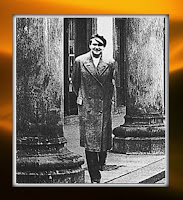













































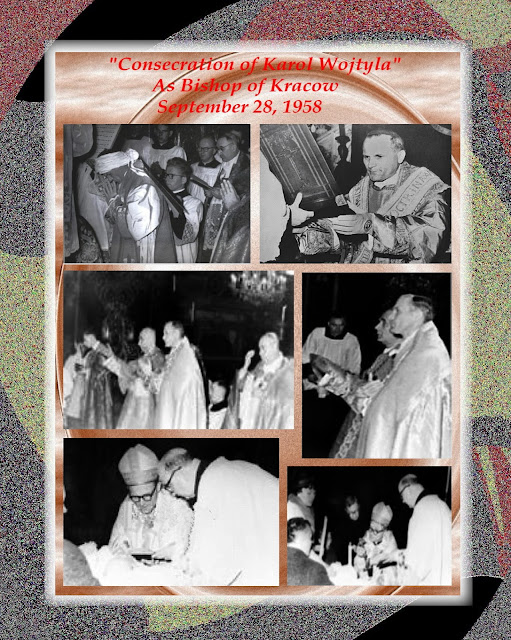


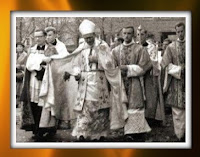













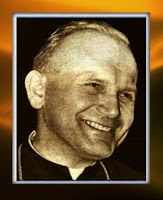













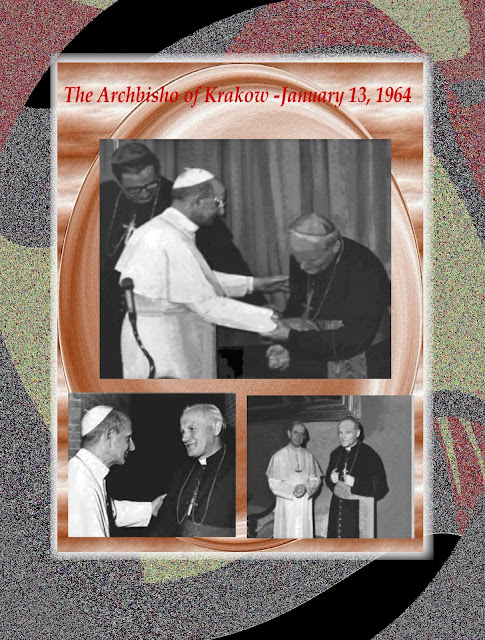



































































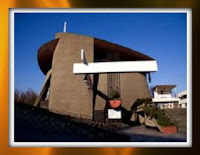











.jpg)
.jpg)

























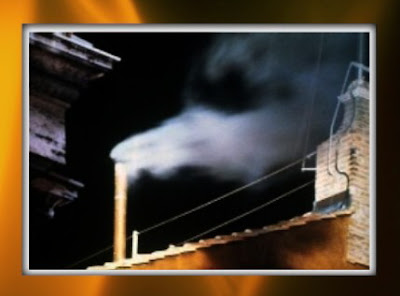














Errors correct:
ReplyDeletefot 7.
Emilia, Edmund Karol Wojtyła.
fot 18.
Edmud Wojtyła Medicine Doctor
fot. 45
Mieczysław Kotlarczyk
fot. 49
Cardinal Prince Adam Sapiecha
fot. 195
Cardinal Wyszynski
fot 239, 240, 241
Cardinal Wyszynski
thank you for this wonderfull display of John Paul II
ReplyDelete